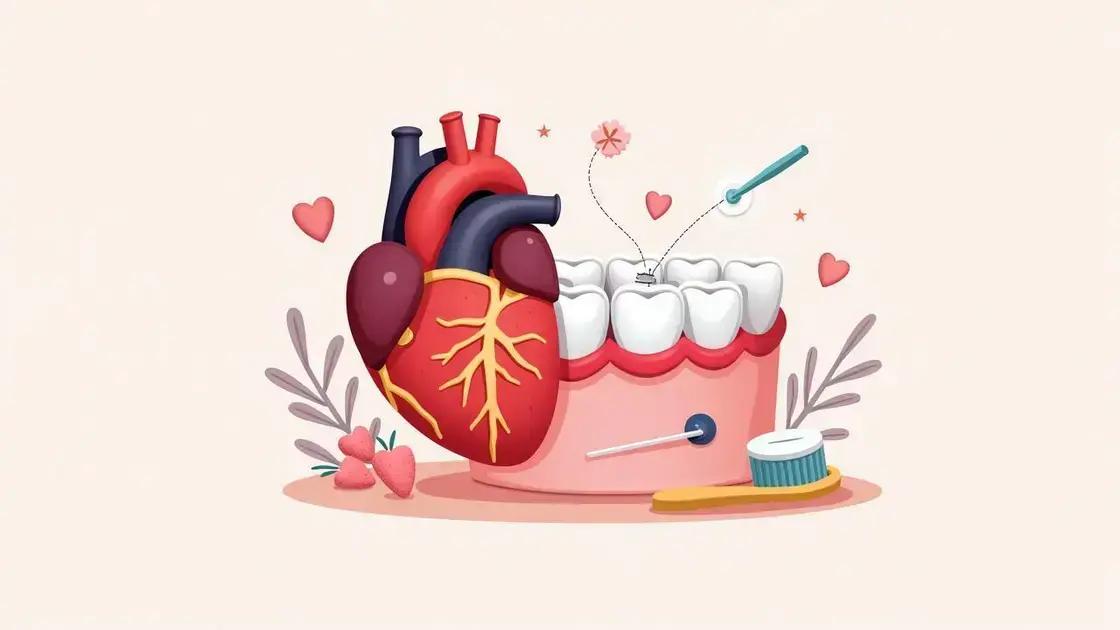Maintaining healthy gums is essential for better cardiovascular health. Regular dental check-ups help detect gum disease early, while a balanced diet rich in vitamins, coupled with effective oral hygiene practices like brushing and flossing, can promote gum health and reduce the risk of heart-related issues.
Maintaining healthy gums is crucial for better cardiovascular health, as research shows a clear connection between the two. In this article, we will delve into effective strategies to keep your gums in top shape while enhancing your heart health. By understanding the link between gum disease and heart issues, you can take proactive steps to protect both your oral and cardiovascular well-being. Let’s explore essential tips and dietary choices that promote healthy gums.
Understanding the Link Between Gum Health and Heart Health

Understanding the connection between gum health and heart health is essential for maintaining overall wellness. Research has shown that inflammation in the gums can contribute to heart disease. When bacteria in the mouth cause gum infection, it enters the bloodstream. This can lead to the formation of plaques in arteries, increasing the risk of heart issues.
How Gum Disease Affects Heart Health
Gum disease, known as periodontal disease, can cause chronic inflammation. When your gums are unhealthy, your body responds with an inflammatory process. As this inflammation continues, it can negatively impact your cardiovascular system. Studies suggest that individuals with gum disease are at a higher risk for heart attacks and strokes.
Common Risk Factors
Both gum disease and heart disease share common risk factors. Smokers and individuals with diabetes are particularly prone to both conditions. Poor nutrition, stress, and lack of exercise further exacerbate these health issues. By managing these risk factors, you can improve both your gum and heart health.
Maintaining Healthy Gums for Heart Benefits
It’s vital to prioritize your oral hygiene. Regular brushing and flossing, along with dental check-ups, can help keep your gums healthy. This simple act of caring for your gums may contribute significantly to your heart’s health. Being proactive about your oral hygiene not only protects your smile but also supports a healthier heart.
Top Tips for Maintaining Healthy Gums

Maintaining healthy gums is crucial for your overall dental and cardiovascular health. Here are some top tips to ensure your gums stay healthy:
1. Brush Twice a Day
Brushing your teeth at least twice daily is vital. Use a soft-bristled toothbrush and fluoride toothpaste. Make sure to brush for a full two minutes, covering all tooth surfaces and around the gum line.
2. Floss Daily
Flossing every day helps remove food particles and plaque from between your teeth where a toothbrush can’t reach. This prevents gum disease and promotes healthy gums.
3. Use Mouthwash
Antibacterial mouthwash can help reduce plaque and prevent gingivitis. Rinse with mouthwash after brushing and flossing to give your gums an extra shield against bacteria.
4. Maintain a Balanced Diet
Eating a diet rich in vitamins and minerals supports gum health. Foods high in vitamin C, such as oranges and strawberries, can help strengthen gums. Avoid sugar-rich foods to reduce the risk of cavities and gum disease.
5. Avoid Tobacco Products
Smoking and using tobacco products can harm your gums and lead to gum disease. Quitting can greatly improve your gum health and overall well-being.
6. Stay Hydrated
Drinking enough water is essential for maintaining saliva flow, which helps wash away food particles and bacteria. Aim for at least 8 glasses of water a day.
7. Schedule Regular Dental Visits
Visit your dentist at least twice a year for check-ups and cleanings. Dentists can spot early signs of gum disease and help you maintain optimum oral health.
Foods That Promote Gum Health

Including certain foods in your diet can significantly boost gum health and contribute to better cardiovascular health as well. Here are some foods that promote healthy gums:
1. Leafy Greens
Leafy greens, such as spinach and kale, are high in vitamins and minerals. They provide essential nutrients that support gum tissue. Their fibrous nature helps scrub away plaque on your teeth.
2. Berries
Berries like strawberries, blueberries, and raspberries are rich in vitamin C, which is vital for gum health. Vitamin C helps heal gums and reduces inflammation.
3. Nuts and Seeds
Nuts and seeds are excellent sources of healthy fats and minerals. Almonds and walnuts provide calcium and vitamin E, promoting gum health and reducing inflammation.
4. Fish
Fatty fish, such as salmon and mackerel, are rich in omega-3 fatty acids. These healthy fats have anti-inflammatory properties that can benefit your gums and overall heart health.
5. Green Tea
Green tea is loaded with antioxidants. It contains compounds called catechins, which can help reduce inflammation and lower the risk of gum disease.
6. Onions
Onions have antibacterial properties that help fight harmful bacteria in the mouth. Eating raw onions can kill germs and contribute to better gum health.
7. Dairy Products
Dairy products such as yogurt, cheese, and milk are rich in calcium and protein. They strengthen teeth and gums while promoting saliva production, which helps clean your mouth.
Adding these foods to your diet can help ensure your gums remain healthy, which in turn supports better cardiovascular health.
Regular Dental Check-Ups for Cardiovascular Wellness

Regular dental check-ups play a crucial role in maintaining not just oral health, but also cardiovascular wellness. Here are some reasons why you should schedule dental visits consistently:
1. Early Detection of Gum Disease
During dental check-ups, dentists can spot early signs of gum disease before they become serious. Untreated gum disease can lead to systemic inflammation, impacting heart health.
2. Professional Cleanings
Professional cleanings remove plaque and tartar that regular brushing cannot. This helps maintain healthy gums and reduces the risk of heart-related issues linked to gum inflammation.
3. Monitoring Overall Health
Dentists can monitor signs of overall health conditions, such as diabetes and high blood pressure, which are closely related to gum health. Identifying these conditions early can prevent further complications.
4. Education on Oral Care
During your visit, your dentist provides tips and education on effective brushing and flossing techniques. Proper oral hygiene contributes to healthier gums, supporting cardiovascular health.
5. Customized Treatment Plans
If there are any issues with your gums or teeth, your dentist can recommend personalized treatment. This ensures you maintain good oral health, which in turn supports a healthy heart.
6. Building a Dental History
Regular check-ups create a comprehensive dental history, allowing your dentist to notice any changes in your oral health over time. This historical overview is vital for addressing any emerging health problems.
7. Peace of Mind
Knowing you are taking care of your oral health provides peace of mind. Understanding the link between healthy gums and heart health can motivate you to keep up with regular appointments.
In Summary: The Key to Healthy Gums and a Healthy Heart
Maintaining healthy gums is essential for promoting better cardiovascular health. By understanding the link between gum health and heart health, you can take effective steps to care for your gums.
Incorporating top tips for maintaining gum health, such as brushing, flossing, and regular dental check-ups, can significantly enhance your oral hygiene. Additionally, choosing foods that promote gum health is crucial for combining nutritional benefits with oral care.
Regular dental check-ups are vital for early detection, professional cleanings, and customized treatment plans that can protect both your oral and cardiovascular health. By prioritizing your gum health, you not only improve your smile but also contribute to your overall wellness.
Ultimately, healthy gums can play a significant role in a healthier heart, making it imperative to adopt effective oral care practices.
FAQ – Frequently Asked Questions about Maintaining Healthy Gums for Better Cardiovascular Health
How often should I visit the dentist for check-ups?
You should visit your dentist at least twice a year for regular check-ups and cleanings to maintain healthy gums and support cardiovascular health.
What foods are best for promoting healthy gums?
Foods high in vitamins and minerals, such as leafy greens, berries, fish, nuts, and dairy products, are excellent for promoting gum health.
Can gum disease affect my heart health?
Yes, gum disease can lead to inflammation and bacteria entering the bloodstream, which may increase the risk of heart disease.
What are effective ways to maintain healthy gums?
Effective ways include brushing teeth twice daily, flossing daily, using mouthwash, maintaining a balanced diet, and avoiding tobacco products.
How can I tell if I have gum disease?
Common signs of gum disease include swollen or bleeding gums, persistent bad breath, and receding gums. If you notice these symptoms, visit your dentist.
Is regular dental check-up necessary if I have no dental issues?
Yes, regular dental check-ups are essential for prevention. They help detect early signs of gum disease and other oral health issues that may not be noticeable.













